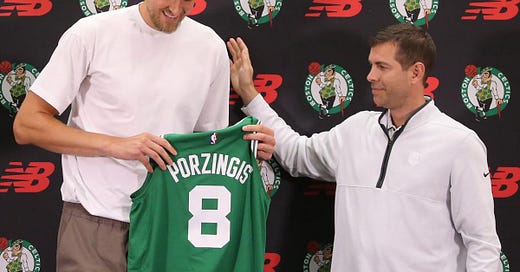An archaeology of hurt
When we rewrite the dark parts of an athlete's history by giving them too much air, and when we're fast to forget the NBA's mistakes by not.
How do we talk about this? These people?
Do we?
I don’t, but then I don’t have to.
But then, does anyone?
This is the carousel refrain my head goes through when Kristaps Porzingis, Miles Bridges, Chauncey Billups, Kevin Porter Jr., Derrick Rose, etc. get brought up in NBA analysis. Get brought up at all. In the case of mostly Porzingis, it was a refrain tha…
Keep reading with a 7-day free trial
Subscribe to BASKETBALL FEELINGS to keep reading this post and get 7 days of free access to the full post archives.


